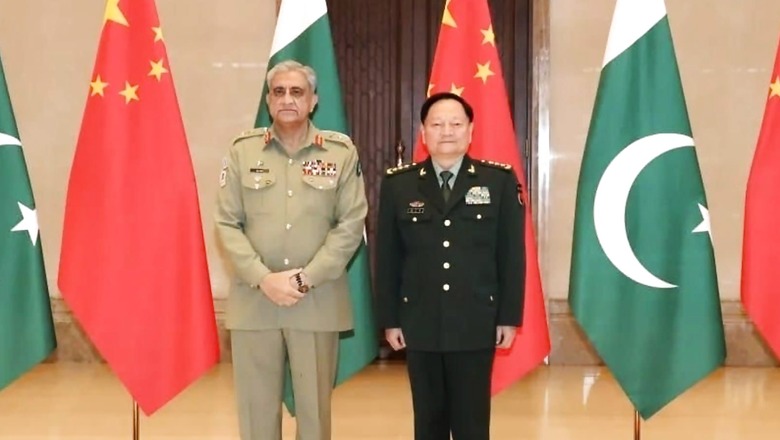
views
In the wake of China and Pakistan welcoming “interested” countries in the China-Pakistan Economic Corridor (CPEC) projects, India on Tuesday said that participation of any third country will be considered illegitimate.
The spokesperson for the ministry of external affairs (MEA) Arindam Bagchi said: “We have seen reports on encouraging a proposed participation of third countries in so-called CPEC projects. Any such actions by any party directly infringe on India’s sovereignty and territorial integrity. India firmly and consistently opposes projects in the so-called CPEC, which are in Indian territory that has been illegally occupied by Pakistan.”
India said such activities are “inherently illegal, illegitimate and unacceptable, and will be treated accordingly”.
Pakistan’s Foreign Office in a statement termed India’s comments “baseless and misguided” and an effort to politicise the CPEC.
Here’s all you need to know about the CPEC and India’s stance:
THE CPEC
The CPEC was launched in 2013 to improve Pakistan’s road, rail and energy transportation infrastructure, besides connecting Pakistan’s Gwadar port on the Arabian Sea with northwest China’s Xinjiang Uygur Autonomous Region.
The CPEC is part of China’s ambitious Belt and Road Initiative (BRI). The major CPEC projects underway are Bostan Industrial Zone (SEZ) near Quetta, Balochistan; Chaman district of Balochistan bordering with Afghanistan; Gwadar Port, Specially Zone-I & Zone-II; some patrolling units on CPEC’s western alignment which covers hostile areas of Balochistan like Awaran, Khuzdar, Hoshab and Turbat areas; Mohmand Marble City (SEZ) near Mohmand Agency bordering with Afghanistan and Sost Dry-Port & Moqpondass Special Economic Zone Gilgit-Baltistan.
It has met with stiff resistance from Balochistan and sections of the Pakistani workers who are working in its projects.
India has lodged its protest to China regarding the CPEC outlining that it is being laid through Pakistan-occupied Kashmir (PoK).
Chinese president Xi Jinping, however, highly values the $60-billion flagship project of the BRI and sees it as a tool to gain regional and global supremacy.
THE DECISION
On July 23, the Pakistani and Chinese officials associated with the CPEC held the third meeting of the CPEC Joint Working Group (JWG) on International Cooperation and Coordination (JWG-ICC).
The meeting was chaired by Pakistan’s foreign secretary Sohail Mahmood and China’s assistant foreign minister Wu Jianghao.
“As an open and inclusive platform, both sides welcomed interested third parties to benefit from avenues for mutually beneficial cooperation opened up by CPEC,” the Pakistan foreign office said in a statement, according to a report by PTI.
PAK SAYS
Pakistan’s Foreign Office said that “the CPEC is a transformational project and a harbinger of stability, mutual cooperation and shared development for the region.” “As a flagship of the Belt and Road Initiative and hallmark of the Pakistan-China All-Weather Strategic Cooperative Partnership, CPEC provides a vehicle for the people of the region to break from zero-sum approaches,” it said.
China’s investment in CPEC has helped Pakistan overcome the energy and infrastructural bottlenecks that once constrained growth and development, it added. Attempts to cast aspersions over CPEC show India’s insecurity as well as the pursuit of a hegemonic agenda that has held back socio-economic development in South Asia for decades, said the FO.
Rejecting India’s assertion that CPEC impinges on its sovereignty and territorial integrity, the Foreign Office said that it is in fact “India that is illegally occupying Kashmir for over seven decades while perpetrating gross and widespread human rights violations”.
WHY INDIA IS AGAINST THE CPEC
India’s position on China’s ‘One Belt One Road’ (OBOR) or BRI has been clear and consistent.
According to the MEA, India’s concerns arise in part from the fact that the inclusion of the so-called illegal ‘China-Pakistan Economic Corridor’ (CPEC) as a flagship project of ‘OBOR/BRI’, directly impinges on the issue of sovereignty and territorial integrity of India.
Our response to media queries regarding participation of third countries in CPEC Projects:https://t.co/ma8tupeZYI pic.twitter.com/PYtzvYczNY— Arindam Bagchi (@MEAIndia) July 26, 2022
The CPEC passes through parts of the Union Territories of Jammu & Kashmir and Ladakh, which are under illegal occupation of Pakistan. India has conveyed its concerns to the Chinese side about their activities in areas illegally occupied by Pakistan in the Union Territories of Jammu & Kashmir and Ladakh and has asked them to cease such activities.
Further, the Indian Government is of the firm belief that connectivity initiatives must be based on universally recognized international norms.
They must follow principles of openness, transparency and financial responsibility and must be pursued in a manner that respects sovereignty, equality and territorial integrity of other nations.
INDIA’s STAND SUPPORTED BY OTHER COUNTRIES
Many Western countries and their experts view the CPEC as an economic debt trap tool used by China to hold member nations’ sovereignty hostage.
The Indian Government’s consistent position has also been endorsed by other countries.
The India-USA Joint Statement ‘Prosperity through Partnership’ released in June 2017 called upon all nations to support bolstering regional economic connectivity through transparent development of infrastructure and the use of responsible debt financing practices, while ensuring respect for sovereignty and territorial integrity, the rule of law and the environment.
The India-Japan ‘Prosperity through Partnership’ released in September 2017 also underlined the importance of all countries ensuring the development and use of connectivity infrastructure in an open, transparent and non-exclusive manner based on international standards and responsible debt financing practices, while ensuring respect for sovereignty and territorial integrity, the rule of law and the environment.
The European Commission issued a Joint Communication in September 2018 titled ‘Connecting Europe and Asia – Building blocks for an EU Strategy’, which highlighted that the European Union promotes an approach to connectivity, which is sustainable, comprehensive and rules-based.
Last month, US President Joe Biden and other G7 leaders unveiled ambitious plans to mobilise USD 600 billion in funding by 2027 to deliver transparent and game-changing infrastructure projects in developing countries like India, in a move seen as a counter to China’s BRI.
ALL’s NOT WELL?
News18 had reported how amid recent terror attacks on Chinese nationals and BRI projects, China had demanded military outposts for the security their citizens working in Pakistan, putting the latter in a tight spot.
In what could spell more trouble for cash-strapped Pakistan, the International Monetary Fund (IMF) in June asked the government to renegotiate the CPEC energy deals before making payments of around 300 billion PKR to the Chinese power plants.
Sources told CNN-News18 that the IMF suspected that the Chinese independent power producers (IPPs) might have been overcharging Pakistan and there was a need to reopen the deals. The Mohammad Ali report on the IPPs had identified overpayment of about Rs 41 billion to the Chinese IPPs.
With Agency Inputs
Read all the Latest News and Breaking News here



















Comments
0 comment